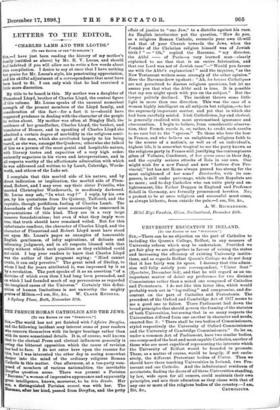LETTERS TO THE EDITOR.
"CHARLES LAMB AND THE LLOYDS."
(TO TIII EDITOR OF THE " SPECTATOR: J STE,■••I have just been reading the history of my mother's family (entitled as above) by Mr. E. V. Lucas, and should feel indebted if you will allow me to write a few words about this compilation. I desire to say at once that I have nothing but praise for Mr. Lucas's style, his penetrating appreciation, and his skilful adjustment of a correspondence that must have been hard to fit. I can only wish that he had exercised a little more discretion.
My title to he heard is this. My mother was a daughter of Plumstead Lloyd, brother of Charles Lloyd, the central figure of this volume. Mr. Lucas speaks of the unusual numerical strength of the present members of the Lloyd family, and consideration of this fact—for a fact it is—should have suggested prudence in dealing with the character of the people he writes about. My mother was often at Bingley Hall, the residence of her grandfather, Charles Lloyd, the banker, and translator of Homer, and in speaking of Charles Lloyd she admitted a certain degree of morbidity in the religious senti- ment of the man, which she attributed largely to his being reared, as she was, amongst the Quakers; otherwise she talked of him as a person of the most genial and hospitable nature, with literary tastes and capacities of a very high order, eminently sagacious in his views and interpretations, and in all respects worthy of the affectionate admiration with which he was addressed and written to by Lamb, Coleridge, Words- worth, and others of the Lake set.
I complain that this morbid side of his nature, and by direct indication or implication, the morbid side of Plum- stead, Robert, and I may even say their sister Priscilla, who married Christopher Wordsworth, is needlessly darkened. Mr. Lucas may ask, "In what way ?" I reply, by his own pen, by his quotations from De Quincey, Talfourd, and the exquisite, though perfidious, fooling of Charles Lamb. The descendants of the family must necessarily be concerned in representations of this kind. They are in a very large measure foundationless ; but even if what they imply were true, that truth should have remained veiled. But for this unfortunate candour, the character of Charles Lloyd, and the character of Plumstead and Robert Lloyd must have stood out upon Mr. Lucas's pages as examples of honourable English gentlemen, of lofty aspirations, of delicate and informing judgment, and in all respects blessed with that sanity without which such qualities as they exhibited could not exist. I beg your readers to know that Charles Lloyd was the author of that pregnant saying "Mind cannot create, it can only perceive." The great mind of Shelley, to whom I had for years attributed it, was impressed by it as by a revelation. The poet speaks of it as an assertion " of a doctrine of which even then I had long been persuaded, and on which I had founded much of my persuasions as regarded the imagined cause of the Universe." Certainly this defini- nition of human limitations is not unworthy the mighty genius of Milton.—I am, Sir, &c., W. CLARK RUSSELL.
9 Sydney Place, Bath, November 271h.










































 Previous page
Previous page